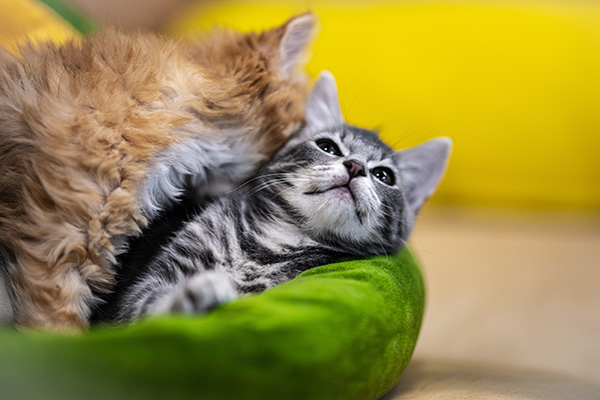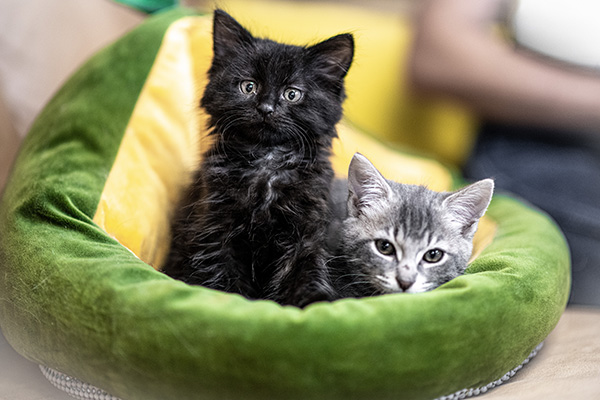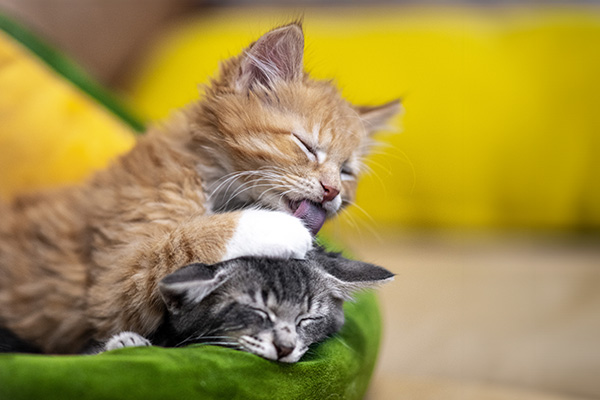Are you ready to learn the essentials of raising happy and healthy kittens?
Meet Elle, our Petdirect Digital Designer, by day and dedicated orphaned neonatal kitten foster home by night! When she's not creating stunning digital designs in the office, Elle is busy nurturing and caring for newborn kittens who don’t have a mum. Today, Elle shares her expert advice that she often shares with adoptive parents of her kittens and practical tips on how to provide the best care for your new adopted furbaby. Let’s dive into the details...
Kitten admin/the basics
Peace of mind for a lost kitty Get your kitten microchipped (if they aren’t already) and make sure you register it with NZCAR, the New Zealand Companion Animal Register, and save your login details. This ensures your contact info is always up to date and you'll be notified if your furry friend ever gets lost and is found. Rescues and vet clinics will scan every cat to check for a microchip, ensuring a swift reunion. Kittens can be crafty and may sneak out an open window that you didn’t know they could yet reach so it’s great peace of mind knowing they have your details loaded onto a chip right from young.

Registering with a vet and getting vaccinated
Sign your kitten up with a veterinary clinic. Most kittens that have been adopted from a rescue or a breeder have had at least their first vaccination so check their vet book for the next due date, which will usually be in the next couple of weeks. The first three vaccines are given 3-4 weeks apart and are due annually after that. Vaccinations are important as they protect your little kitty against Feline Panleukopenia, Feline Calicivirus, and Feline Herpesvirus, even for indoor cats.
A little tip for those vet appointments is that you can ask your veterinarian to trim your kittens nails while you’re there. Kittens have tiny but sharp claws. It might help having young children or elderly to keep on top of trimming your cat's nails and if you aren’t confident enough to do this at home, your vet can do it safely. These vet early vet appointments are also a great chance to see how much weight your new kitten is putting on and to check their overall health as well.
Transitioning time
Bringing a new pet home is a time of transition and adjustment for everyone involved. Each step is done with patience, kindness and to go at your pet’s pace.
Transitioning diets - Sudden dietary changes can upset a kitten's stomach. It’s best to keep your new kitten on their previous diet initially and gradually transition them to new food if needed.

Introducing a Kitten to an existing Pet
Introduce new pets slowly and patiently, especially with cats. Cats are territorial and need time to adjust. Here are some tips for introducing two cats:
- Gradual Introduction: Keep the kitten separate initially, allowing the existing cat to get used to the new scent. Increase exposure gradually with supervised meetings.
- Supervised Meetings: Start with short, supervised meetings in neutral territory. Reward positive interactions with treats and praise. Be prepared to separate them if needed.
- Positive Reinforcement: Use treats and praise to reinforce good behaviour during interactions.
- Patience and Persistence: Allow time for both cats to adjust. They may not enjoy each other initially, but with patience and consistent efforts, they can learn to coexist peacefully.
Litter Trays
One common issue with a new kitten is litter tray problems.
- Litter Preference: Cats may have preferences for the type of litter they like or are used to. Stick with what they’ve been using, whether it's wood chip pellets, clumping, or clay litter.
- Transitioning: Keep your new kitten confined to one room initially to help them adjust to their new environment. This smaller space allows them to establish a safe zone and reduces the likelihood of toileting accidents in undesirable locations.
- Patience: Understand that the transition can be overwhelming for your kitten. Be patient and give them time to acclimate to their new surroundings.
By following these tips, you can help your new kitten feel more comfortable and reduce the likelihood of litter tray problems during the adjustment period.

Enrichment
Kittens are active and require lots of enrichment. Make sure your new kitten has plenty of toys and that you spend quality time with them daily. Cats need enrichment, love, attention, and one-on-one time. Cats are apex predators with an instinct to hunt, so play with them using cat teasers and other toys to simulate hunting.
- Cat Tower: Set up a cat tower or tree near a window so your cat can lounge up high, get some sun, or watch birds and outside activity.
- Scratching Post: Ensure your scratching post is tall enough for your cat to fully extend for a satisfying stretch.
Letting Them Outdoors
Keep your new kitten indoors initially to get used to the new environment, sounds, and smells. Some kittens are more curious about the outside and will want to explore. Before letting them outside, get them used to wearing a kitten harness or a breakaway collar. Start with small excursions around the property on a harness to prevent them from getting spooked and bolting. Go at your kitten’s pace and start with small excursions. If you plan to keep your cat indoors only, taking them out on a harness can be a safe enrichment activity.
With these expert tips from Elle, you’re well-equipped to provide the best care for your new kitten. From ensuring their microchip details are up to date to gradually introducing them to new pets, every step you take contributes to a happy, healthy, and well-adjusted feline friend. Remember, patience and consistency are key, and the bond you build with your kitten during these early stages will last a lifetime. At Petdirect, we’re here to support you every step of the way on your journey of raising a joyful and thriving kitten. Happy pet parenting!
